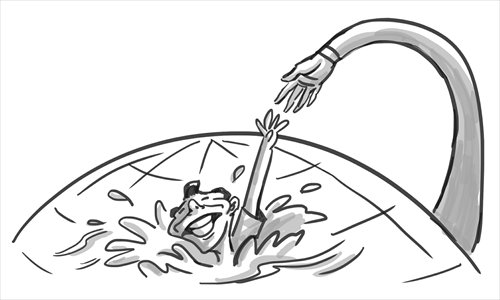Lessons for China amid fears for euro crisis

As long as the peoples of peripheral European countries suffer from austerity and calamity, they will dream of saviors.
These saviors can supposedly provide oxygen - fresh money - for their economic asphyxiation. They can also hypothetically put an end to the unbearable supervision led by the so-called Troika, namely the representatives of the European Commission, the European Central Bank and the International Monetary Fund. There are two main countries which are often portrayed as saviors in the logic and imagination of angry European citizens in problematic countries: China and Russia. The first constitutes a rising economic power and is able to grant immediate liquidity, while the second has been for years the driving force of a small eurozone economy, that of Cyprus.
International attention was recently turned toward the role of Russia. That is because Cyprus unsuccessfully sought to find alternate funds from Moscow in order to finance its economy. In particular, after its national parliament rejected the first European rescue package imposing a "haircut" on bank deposits, it was prepared to make important offers to the Kremlin in exchange for economic assistance. Access to offshore gas deposits and a warm-water port are characteristic examples.
Nonetheless, Russia rejected the Cypriot proposal. In spite of heavy losses for many Russian businessmen having bank accounts on the island, it did not decide to intervene.
By contrast, it let Cyprus desperately return to Brussels and accept worse terms in comparison to the initial bailout. These terms will be felt by ordinary citizens in the dramatic weeks and months to come.
So, does the stance of Russia suggest that the theory of saviors for peripheral European states is nonexistent? Does it signal that only the Troika will dictate bailout terms for problematic states in the years ahead? The answer seems to be rather negative even if the specific term "savior" might not be applicable.
The country which can possibly learn valuable lessons from the recent crisis in Cyprus is certainly China.
As opposed to Russia, China is not accused of money laundering in Europe. On that basis, its involvement can only with difficulty be undermined from an ethics perspective. In other words, China might engage more actively following its economic interests in the integrity of the eurozone and not its need to guarantee the survival of fiscal paradises.
Furthermore, China can benefit if it places its economic policy within the framework of complementing but not challenging the efforts of Brussels. If an agreement between Cyprus and Russia had been reached after the "no" vote of the Cypriot parliament, for example, this might have been regarded as a hostile action in Europe. Beijing will perhaps improve its international position by employing - in cooperation with the eurozone - a clear, straightforward and transparent strategy.
The undertaking of occasional initiatives at the expense of the latter - when single member states such as Cyprus are seeking external financial assistance - contains elements of an opportunistic policy. Instead of opportunism, what matters more for a rising power such as China is the expansion of a network of long-standing and powerful alliances in the world arena.
China, however, lacks an efficient communication strategy to boost its economic policy in Europe, as also happened with Russia. Since the outbreak of the European debt crisis in October 2009, both countries did not provide specific details on their policy involvement on the Old Continent. There are rumors, for instance, that Beijing has bought Greek, Portuguese and Spanish bonds, but no numbers have been announced.
Ambiguous information also exists about privatization plans. It is now maybe a good opportunity for China to communicate the results of its economic policy in Europe. For the time being, European citizens learn about its role from the media, but feel that the provided financial assistance is both distant and opaque.
The continuation of the European debt crisis might in the short term negatively influence Beijing by significantly hitting its exports. In the long run, however, it will possibly accelerate its ascendancy at the global economic level provided the common currency survives. This ascendancy can be better accompanied by an improvement of the international image of China, starting from Europe in times of crisis.
The author is a research fellow at the Hellenic Foundation for European and Foreign Policy. opinion@globaltimes.com.cn